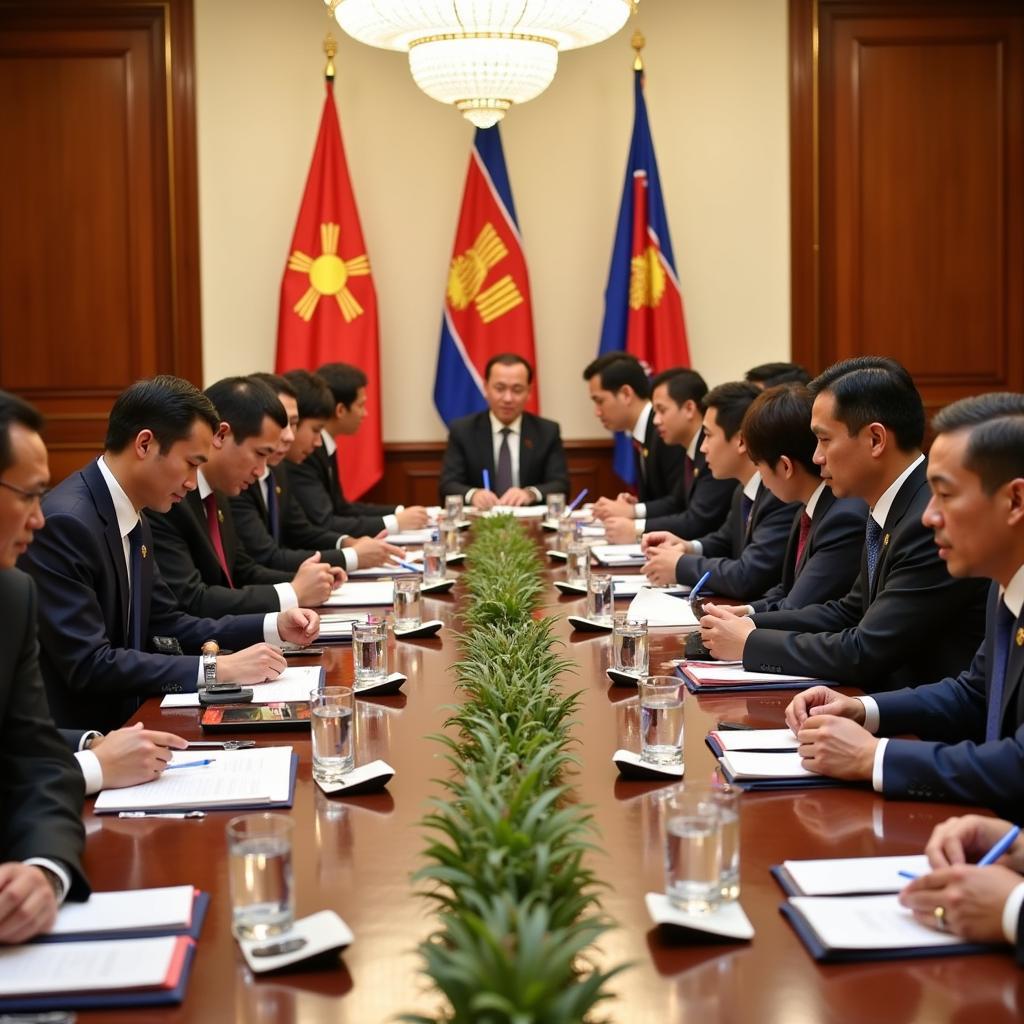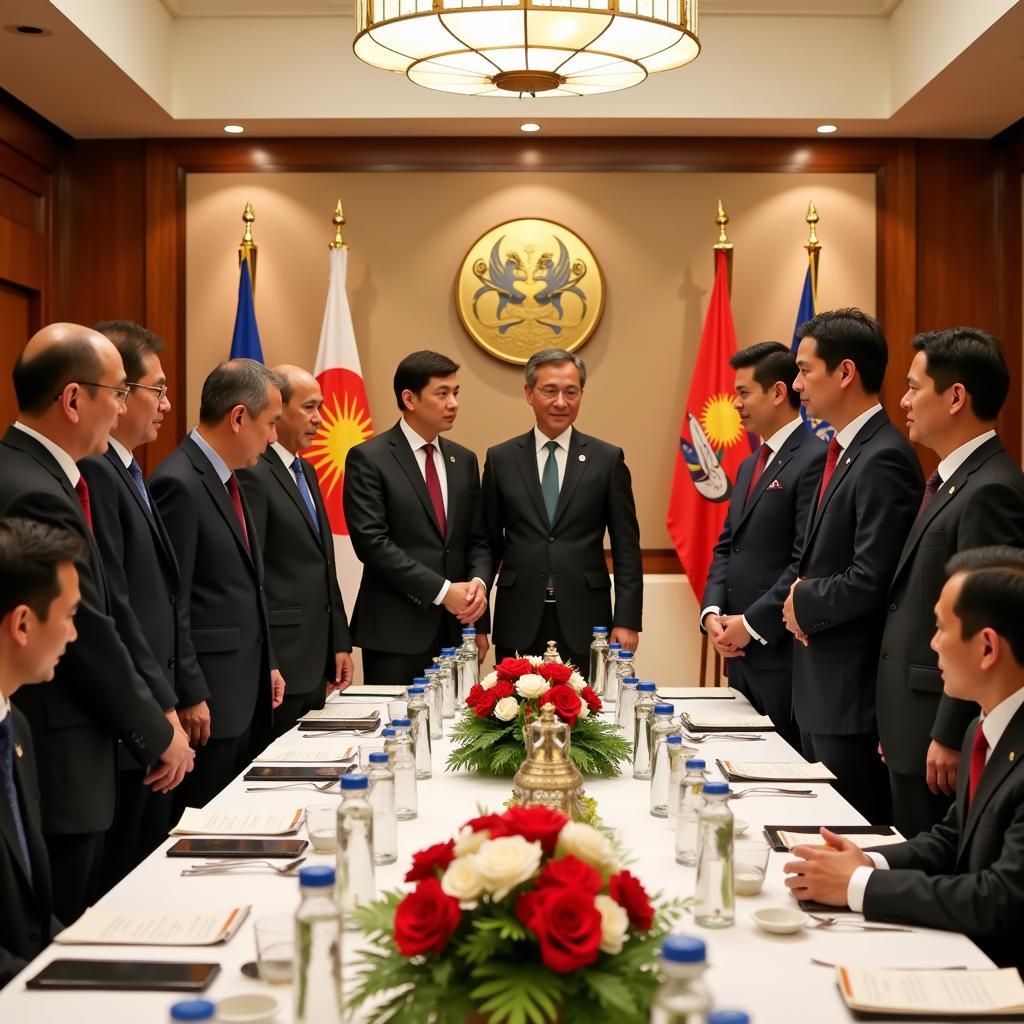The 17th Asean Summit, held in Hanoi, Vietnam in 2010, marked a significant turning point in the trajectory of Southeast Asian integration. This summit addressed critical issues ranging from economic cooperation to regional security, solidifying ASEAN’s role on the global stage. The summit saw the signing of key agreements, fostering deeper ties between member states and setting the stage for future collaboration.
The 17th ASEAN Summit underscored the importance of economic integration as a driver of regional growth. The summit saw the launch of the ASEAN Economic Community Blueprint, a comprehensive roadmap designed to establish a single market and production base by 2015. This initiative aimed to promote free flow of goods, services, investment, and skilled labor within the region. The summit also focused on enhancing connectivity, both physical and digital, to facilitate seamless trade and communication. More on ASEAN’s expanding partnerships can be found on our page about ASEAN Plus.
Economic Cooperation and the ASEAN Economic Community
The establishment of the ASEAN Economic Community was a central theme of the 17th ASEAN Summit. Leaders recognized the immense potential of a unified economic bloc, enabling ASEAN to compete more effectively in the global marketplace. The summit emphasized the need to streamline regulations, harmonize standards, and remove trade barriers to create a more conducive environment for businesses. Further discussion regarding collaborations with other countries took place during the 17th ASEAN Plus Three Summit.
Strengthening Regional Connectivity
Improving connectivity, both physical and digital, was a key priority discussed at the summit. Leaders acknowledged the crucial role of efficient transportation networks and robust digital infrastructure in fostering economic integration. Initiatives to develop cross-border infrastructure projects and enhance information and communication technology were discussed, aimed at reducing trade costs and promoting greater regional interconnectedness.
 17th ASEAN Summit Economic Cooperation Discussion
17th ASEAN Summit Economic Cooperation Discussion
Security Challenges and Regional Stability
The 17th ASEAN Summit also addressed pressing security challenges facing the region. Leaders discussed issues ranging from maritime security to transnational crime and terrorism. The summit reaffirmed ASEAN’s commitment to peaceful dispute resolution and its central role in maintaining regional stability. You can learn more about earlier collaborations in our article on the 7th ASEAN Summit.
Maritime Security and the South China Sea
The South China Sea issue was a prominent topic of discussion at the summit. Leaders emphasized the importance of maintaining peace and stability in the disputed waters and reiterated their commitment to resolving disputes through peaceful means in accordance with international law. The summit called for enhanced cooperation in maritime security, including joint patrols and information sharing, to address common challenges such as piracy and illegal fishing.
“Maintaining peace and stability in the South China Sea is paramount for regional prosperity,” commented Dr. Nguyen Thi Minh Anh, a prominent expert on Southeast Asian geopolitics. “The 17th ASEAN Summit provided a crucial platform for dialogue and cooperation on this vital issue.”
Expanding Partnerships and Global Engagement
The 17th ASEAN Summit reaffirmed ASEAN’s commitment to fostering stronger partnerships with external partners. Leaders engaged in dialogues with representatives from key dialogue partners, including China, Japan, and India. The summit emphasized the importance of multilateralism and regional cooperation in addressing global challenges. Discussions with Japan are detailed further in our article on the 17th ASEAN-Japan Summit.
ASEAN and its Dialogue Partners
The summit provided an opportunity for ASEAN to strengthen its relationships with key dialogue partners. Leaders discussed ways to enhance cooperation in areas such as trade, investment, development, and security. The summit underscored the importance of working together to promote regional and global stability. For more context on past collaborations, see our piece on the 17th ASEAN India Summit 2019.
“ASEAN’s engagement with its dialogue partners is crucial for its continued success,” stated Professor Lee Kuan Yew School of Public Policy’s Dr. Michael Taylor. “The 17th ASEAN Summit demonstrated ASEAN’s commitment to fostering constructive relationships with key global players.”
 ASEAN's Expanding Global Partnerships at the 17th Summit
ASEAN's Expanding Global Partnerships at the 17th Summit
The 17th ASEAN Summit was a pivotal moment in the history of ASEAN cooperation. The summit addressed critical issues related to economic integration, regional security, and global engagement, laying the groundwork for a more prosperous and secure future for Southeast Asia. The outcomes of the 17th ASEAN Summit have had a lasting impact on the region’s development trajectory.
FAQ
- Where was the 17th ASEAN Summit held? (Hanoi, Vietnam)
- What was the main focus of the summit? (Economic integration, regional security, and global engagement)
- What key agreement was launched at the summit? (ASEAN Economic Community Blueprint)
- What was discussed regarding the South China Sea? (Peaceful dispute resolution and maritime security cooperation)
- Who were ASEAN’s key dialogue partners at the summit? (China, Japan, and India)
- What were the main outcomes of the summit? (Strengthened regional cooperation and enhanced global partnerships)
- What was the significance of the 17th ASEAN Summit? (Marked a turning point in ASEAN’s development trajectory)
For any support, contact us at: Phone: 0369020373, Email: [email protected] or visit us at: Thôn Ngọc Liễn, Hiệp Hòa, Bắc Giang, Việt Nam. We have a 24/7 customer service team.
